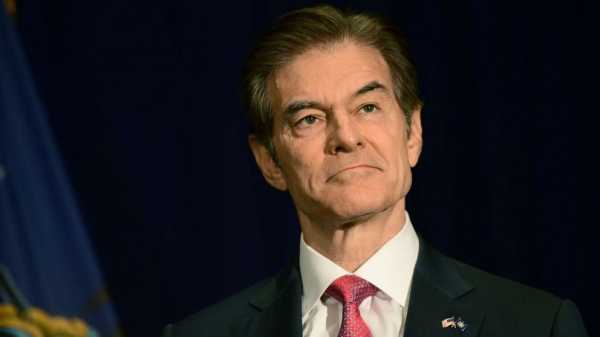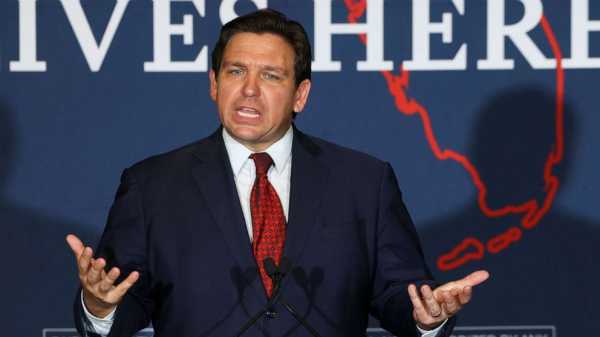The TAKE with Rick Klein
For all the rightful talk of the Republican Party defining itself around its extremes, what’s left of the middle — or at least what candidates can hope to get out of self-labeling — could shape the party’s success in key races this year.
Witness Mehmet Oz in Pennsylvania. Oz is running for Senate with former President Donald Trump’s backing but, when asked by ABC News’ Linsey Davis if he considers himself a “MAGA Republican,” he responded by embracing a different m-word.
“I think I’m a moderate leader, but not passive,” Oz said in an interview that will stream on ABC News Live on Thursday at 7 p.m. ET.
Oz won Trump’s endorsement in the primary but has stopped short of backing false claims about the 2020 election. That’s in contrast with Pennsylvania GOP gubernatorial candidate Doug Mastriano, a MAGA loyalist who has long promoted election falsehoods and has leaned in on his opposition to abortion access — and whose polling has drawn recent national Republican impatience with his prospects.
In Georgia, Gov. Brian Kemp is polling ahead of both his Democratic challenger, Stacey Abrams, as well as his fellow Republican running for Senate, Herschel Walker. Kemp’s refusal to endorse Trump’s false claims about the last election earned him Trump’s anger but appears to be helping his framing during the general election.
In the wake of the Supreme Court’s decision this summer overturning Roe v. Wade, which fueled a voter backlash in some subsequent races, Republicans across the map have been scrubbing their websites and clarifying past statements about abortion rights.
In Colorado — a state where the GOP sees a pick-up opportunity — Republican Senate candidate Joe O’Dea is emphasizing his support for abortion to be legal through 20 weeks of pregnancy. He blasted a proposed GOP nationwide ban on abortion after 15 weeks as just “as reckless and tone deaf” as anything being pursued by Democrats on the subject.
Democrats reject the idea that any of the above candidates should qualify as moderates, particularly if they are supported by Trump or refuse to rule out backing him if he runs again, or if they support the kinds of Supreme Court justices who tossed Roe.
Earlier this month, President Joe Biden clarified an earlier speech by drawing a distinction between “mainstream” and “MAGA” Republicans. Some in the GOP see value in that differentiation — even if Democrats running campaigns may see things otherwise.

Republican U.S. Senate candidate Dr. Mehmet Oz holds a press conference with U.S. Sen. Pat Toomey, Sept. 6, 2022, in Philadelphia.Mark Makela/Getty Images
The RUNDOWN with Averi Harper
The House select committee investigating Jan. 6 has postponed what could be its final public hearing, in light of a hurricane bearing down on the U.S., while legislative efforts that would make it harder to overturn a future presidential election forge ahead.
Senate Minority Leader Mitch McConnell on Tuesday announced his support for the Electoral Count Reform and Presidential Transition Improvement Act, a bipartisan proposal sponsored by Sens. Susan Collins, R-Maine, and Joe Manchin, D-W.Va.
Their legislation, which was successfully voted out of committee on Tuesday, would prevent the vice president from changing the results of the presidential election, affirming that the VP’s role in certifying electors is purely ceremonial. The bill would also increase the number of lawmakers in Congress necessary to raise an objection to election results.
McConnell, in a speech on the Senate floor on Tuesday, said the “chaos” of Jan. 6 “underscored the need for an update” to the 1887 Electoral Count Act.
“I strongly support the modest changes that our colleagues in the working group have fleshed out after literally months of detailed discussions,” he said.
Last week, the House passed similar legislation. Both proposals get at the ongoing threat that candidates who espouse 2020 election lies could pose to future contests. FiveThirtyEight’s analysis found that 60% of Americans will have an election denier on the ballot for major office in November.

Senate Minority Leader Mitch McConnell walks to the Senate Chambers in the Capitol, Sept. 27, 2022.Anna Moneymaker/Getty Images
The TIP with Alisa Wiersema
In past election years, the specter of a major natural disaster has served as an opportunity for public bipartisanship between state and federal executives. But it took days for President Joe Biden and Florida’s Republican Gov. Ron DeSantis to speak to one another despite Hurricane Ian’s impending landfall.
Before Biden and DeSantis spoke on Tuesday night, the White House insisted the lack of direct conversation between the two was not a reflection of their political relationship. Meanwhile, at a Tuesday press conference in Tallahassee, DeSantis appeared to express political neutrality given the circumstances and indicated he would be receptive to a conversation with Biden. Hours later, Biden’s press secretary, Karine Jean-Pierre, tweeted that the two had just talked about Ian and were “committed to … close coordination.”
“My view on all of this is: You have people’s lives at stake, you have their property at stake. We don’t have time for pettiness. We have to work together to make sure that we are doing the best job for them,” DeSantis had said earlier Tuesday.
Biden separately spoke with the mayors of Clearwater, St. Petersburg and Tampa — whose communities could bear the initial brunt of the hurricane’s impact — telling them to “contact me directly” for “whatever they need” while also mentioning DeSantis in passing.
“[The Federal Emergency Management Agency] has already deployed 700 personnel to Florida and the governor has activated 5,000 state National Guard with another 2,000 guards coming from other states. FEMA is also proposing and pre-positioning 3.5 million liters of water, 3.7 million meals and hundreds of generators,” the president said Tuesday afternoon.
During Tuesday’s White House press briefing, FEMA Administrator Deanne Criswell echoed the notion that politics were not at play in the administration’s disaster response.
“We do not bring politics into our ability to respond to these disasters. We’re going to support whatever Gov. DeSantis asks of us,” she said.

Florida Gov. Ron DeSantis speaks to a crowd of supporters during the Keep Florida Free Tour in Tampa, Fla., Aug. 24, 2022.Luis Santana/AP
THE PLAYLIST
ABC News’ “Start Here” Podcast. “Start Here” begins Wednesday morning with Fort Myers’ emergency coordinator, Kristy Mathews, on how the community is preparing for Hurricane Ian. Then ABC News contributor Col. Stephen Ganyard breaks down the investigation of so-called “attacks” on Russian gas pipelines to Europe. And ABC’s Devin Dwyer explains fears of prosecution from those who experience miscarriages. http://apple.co/2HPocUL
WHAT YOU NEED TO KNOW TODAY
- At 10 a.m. ET, President Biden delivers remarks at a White House conference on hunger, nutrition and health. At 11 a.m. ET, he will mark Disability Pride Month and the Americans with Disabilities Act with a speech in the Rose Garden.
- The candidates for Arizona’s attorney general, Republican Abraham Hamadeh and Democrat Kris Mayes, debate starting at 8 p.m. ET.
Sourse: abcnews.go.com